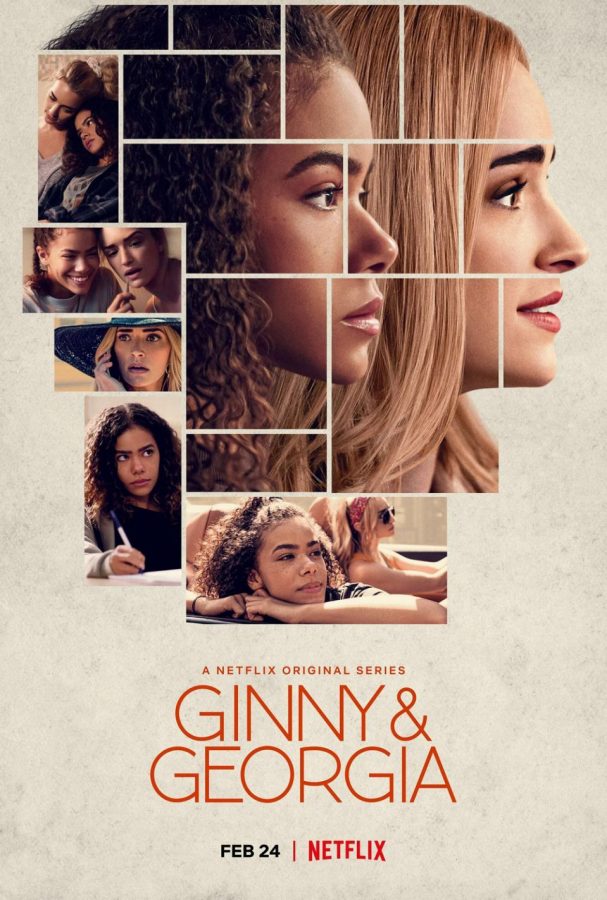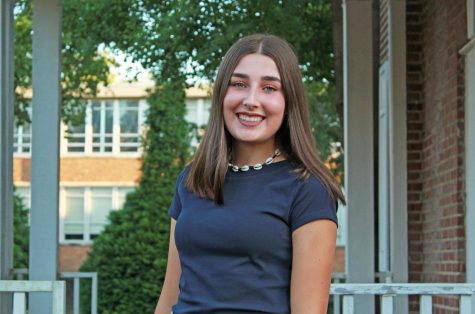‘Ginny and Georgia’ was nothing short of a fiery trainwreck
One of Netflix’s latest releases, “Ginny & Georgia” has had its share of controversy.
April 2, 2021
Netflix’s latest attempt at being ‘woke’ was just that, an attempt. ‘Ginny and Georgia’ tried so hard to tackle relevant social issues, but it fell dramatically short. Though the show had potential to be great, the final product was mediocre and wildly concerning at times, from the characters’ questionable life choices to the show’s abrupt ending.
The series follows the Miller family, which consists of mother Georgia and her two children, Ginny and Austin, who are 15 and nine. The family has just moved to Wellsbury, Mass. after the untimely death of Georgia’s wealthy husband, leaving the family with a large sum of money (or so we thought).
Georgia is described by the show’s IMDb review as irresistible and dynamic, but I would rather call her unhinged. I can’t tell if I’m more irritated about the decisions she makes or about the fact that I care so much about them. In comparison to her mother, Ginny seems tamer. However, she has her struggles too, such as learning how to thrive in a predominantly white community as a biracial teen, while struggling with mental issues and taking care of her younger brother Austin.
Antonia Gentry, the actress tasked with such a crucial role in the series, said in an interview that many of the microaggressions Ginny experienced were based on real experiences that she had growing up. At first, it felt like Netflix was finally tackling race within one of its shows.
However, there is a scene in one of the later episodes that crossed some boundaries. It became very obvious to me, and hopefully everyone else watching the show, that a POC did not write the show’s dialogue. The scene, coined as the “Oppression Olympics,” contains Ginny and her boyfriend Hunter having a “serious conversation” comparing the different racial issues they encountered growing up. The conversation progresses into an argument in which the two just yell offensive racial stereotypes at each other. Whatever progress Netflix made in trying to be more racially inclusive in its shows was lost from this 45-second scene.
Though the rest of the show’s dialogue wasn’t nearly as concerning as the aforementioned scene, it was still horrible. Once again, Netflix has attempted to cater to Gen Z by using popular phrases and mannerisms, but they were all outdated and used improperly. Most of the horrid dialogue was spoken by Ginny’s best friend, Maxine.
If Maxine’s 2016 Jojo Siwa-era wardrobe wasn’t bad enough, she was also obnoxious. The minimal screen time she had was spent talking about whichever girl she was obsessing over at the time. It felt like her only personality trait was being a lesbian, which felt wrong, especially considering the fact that the actress playing Maxine isn’t one. Netflix could have at least cast a lesbian for the role if they really wanted LGBTQ representation that badly.
Honestly, I could go on for days about Netflix’s casting choices in this series. My biggest issue is Gentry. In the show, Ginny is written to be 15 to 16 years old. Gentry, on the other hand, is 23. Netflix has had no issue hiring age-appropriate actors for their shows in the past (remember “Stranger Things”?), so why start hiring older actors now? The clear answer is because Ginny’s character is incredibly sexualized throughout the series, and Netflix didn’t feel comfortable putting a minor in that situation, even though the character is meant to be a child. If Netflix can’t sexualize their characters without hiring adults, then maybe they shouldn’t be sexualizing anyone at all.
There are a plethora of issues with “Ginny and Georgia,” from the casting to the dialect, but a prominent issue is the plot. Aside from the fact that the show ends with at least five plot holes and a lot of untied ends, the events that unfold are concerning. Georgia deserves to go to jail for at least three serious crimes, including murder. She is a terrible mother, and her character is infuriating.
The rest of the family is just as crazy, with Austin being a serial killer in the making and Ginny having the worst relationship issues known to man without actually having relationship issues. In a classic battle similar to “Gilmore Girls,” Ginny must choose between the sweet, caring boy that her mother loves and the angsty skater boy that means nothing but trouble. However, she chooses both, leading to a very frustrating season of watching her destroy her romantic life time and time again.
The plot felt so predictable in so many aspects, yet the season cut off before anything was resolved at all. Who does Georgia fall in love with? Does Ginny learn any good life lessons from that English teacher she hates? The world may never know, seeing as the show ends right at the “good part,” if I can even call it good. I guess this is Netflix’s way of hinting at a season two, but I’m not sure if I want it. As much as I want to know if Georgia ends up incarcerated, it’s hard to tell if I could endure another 10 episodes of cringey Millennial-written jokes and fake representation.










CK • Jun 10, 2025 at 5:52 pm
I just enjoy watching a show without everyone getting offended. We should do that!